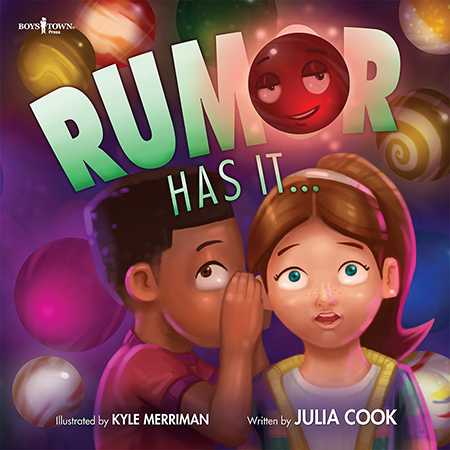Don’t Spill Your Rumor Marbles



Five tips for teaching kids how to cope with and react effectively to rumors.
Have you ever been targeted by a rumor? I have! In seventh grade, I accidentally burned my neck with a curling iron. The burn resembled a hickey. I tried to cover it up with makeup, but it took less than two hours for a rumor to circulate at school that I had made out with someone, was easy and loose and was most likely pregnant! Growing up in an extremely conservative area, I lost most of my friends by the end of the day, and my mother got a call from the school counselor. I wanted to crawl under a rock and never come out!
The truth revealed itself within the week and people moved on, but my middle school experience was forever changed after that event. Many kids seemed to look at me differently – and not in a positive way. I felt as if I was constantly being judged and excluded. My best friend’s mom told her not to hang out with me anymore because I had a wild reputation. I felt like my life was over! It took years for me to recover from my curling iron hickey. Sounds ridiculous? It was!!! And that was over 40 years ago!
They say that knowledge is power… The more we know about a situation, the better we are at interpreting how to react in that situation. But what happens when the knowledge we acquire is false information?
Rumors are pieces of information or stories that have not been verified. They can involve any topic and/or person. Toxic rumors can destroy a person’s self-confidence and damage their self-worth. With the social media phenomenon exploding, the spreading of rumors both good and bad has grown exponentially! Rumors not only influence our perceptions of others (Who do I like? Who do I dislike? Who matters to me? etc.) they alter the way we see the world around us.
Targets of rumors often suffer from depression and anxiety, which can lead to ongoing mental, emotional and physical health challenges. Teaching our kids to cope with and react effectively to rumors is sometimes difficult. Here are a few tips that you may find helpful:
1. Make sure kids understand what a rumor is: A piece of information about someone or something that may or may not be true. Remind kids not tobelieve everything they hear.
2. Silence is Golden! When someone tries to get a person to spread a rumor, he or she is looking for a response from that person. Not providing that response can help prevent that rumor from being spread.
3. Teach your students or kids that if a rumor is ever spread about them, not to dwell on it (this will be hard!). Instead, just step right over it and focus on other things that are more positive. In time, the rumor will run its course and people will move on as well.
4. Help kids sharpen their redirection skills. Changing the subject is one of the easiest ways to avoid talking behind somebody’s back. When they are not successful changing the subject, teach children to reply with, “I’m really trying hard to stay away from spreading gossip and rumors.” If that doesn’t work, they should leave the situation.
5. Model positivity, and help others develop empathy for the target of the rumor. Everyone is dealing with some kind of struggle that people may not know about.
Remember, most people will experience being the target of a rumor or gossip at some point in their lives. And most people will end up gossiping and/or spreading rumors from time to time. Teaching kids to work hard to gossip less is one way to handle this. For both kids and adults, if you actively choose to limit your rumor spreading, you will be happier and feel much better about yourself.
These tips and others can be found in Julia’s latest title, Rumor Has It…
New on the Blog
Self-Care Strategies That Stick: A Blueprint for School Counselors (Part 3)
Part 3: How to build and sustain your personal self-care system Develop a self-care system that work...
Self-Care Strategies That Stick: A Blueprint for School Counselors (Part 2)
Part 2: Eight categories that comprise true self-care In recent years, self-care has become a popula...
Self-Care Strategies That Stick: A Blueprint for School Counselors (Part 1)
Welcome to this three-part blog series on self-care. In Part 1, we’ll explore why self-care is...
The Library: One of Education’s Most Valuable (and Overlooked) Allies
Nothing gets a college student’s attention like the word “free!” As some...
Six Steps to Safeguarding your Child’s Mental Health
Is there a Brad in your family? Brad is a typical middle school kid who just wants to fit in. He doe...
Peer Mediation Programs: Good for Students, Good for Schools
There’s something magical about giving power to students to resolve peer conflicts. No longer...






